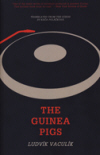The Guinea Pigs
Though hardly a household name in the U.S., Ludvìk Vaculìk is probably best known first among historians for his provocative publications during the Prague Spring in 1968, and then among the more eccentric students of literature and journalism. Even then, he’s not recognized for writing, but for championing modes of literature: samizdat, the precursor of underground DIY zines, which enabled Prague writers to thrive under harsh censorship, and the editorial street-beat columns known as Feuilleton. A Cup of Coffee with my Interrogator, published in 1987, collects Vaculìk’s feuilletonic samizdat essays for an English audience.
Though hardly a household name in the U.S., Ludvìk Vaculìk is probably best known first among historians for his provocative publications during the Prague Spring in 1968, and then among the more eccentric students of literature and journalism. Even then, he’s not recognized for writing, but for championing modes of literature: samizdat, the precursor of underground DIY zines, which enabled Prague writers to thrive under harsh censorship, and the editorial street-beat columns known as Feuilleton. A Cup of Coffee with my Interrogator, published in 1987, collects Vaculìk’s feuilletonic samizdat essays for an English audience.
Would it be too easy to call The Guinea Pigs hezky ?esky? Compared to Kundera or Škvorecky, who’ve found significant success in North America through cosmopolitan and globalized writing, Vaculìk’s work maintains a typically Czech feel, localized in scope and mood. As told by State Bank clerk Vašek, the novel follows a mysterious disappearance of money from circulation, while at home, the arrival of guinea pigs lightens the burden of this knowledge. Vašek’s narration often bumbles between the two spheres of influence sans segue, though they contrast and inform each other as foils, finishing each other’s sentences.
Vašek has a fair dose of Good Soldier Švejk-like idiocy, too; one can’t speak of his innocence with much certainty. His job is limited to counting and stacking 100-crown bills, and he claims to know nothing about advanced economics, but he spends each night calculating, and hides his figures in the bottom of the guinea pig cage. Of course, feigned ignorance is key to survival in a politically-unfriendly environment.
The lynchpin—so to speak—for the Pigs, and arguably for Vaculìk’s political editorials, is the desire for sovereignty. In his “Two Thousand Words,” Vaculìk urged citizens to take action in spurring the communist party toward more democratic policies, which would give workers more freedom in their individual choices as well as an increased say in government. (Vaculìk and his liberal allies also hoped progressive policies would undermine the Soviet influence over Czechoslovakia.) Likewise, the narrator Vašek is acutely aware of his lack of influence. “As you know, a man can be a prince or the merest of the prince’s non-devoted slaves…The one at the bottom is unhappy because he has to obey everybody, and there is no one to obey him. But if he finds that he has at least one creature even one creature lower than himself,”—like a guinea pig—“the world takes on an entirely different aspect.” As Vašek observes and tests his guinea pig subjects, so too are his authorities keeping a close watch over Vašek, testing to see how much he knows.
The issues raised by the novel remain highly relevant, as they likely always will. As protesters in the Arab world demand more personal sovereignty and more transparency of their governments, and as the Obama administration throws the book at watchdogs and whistleblowers, Open Letter Books’s republication of The Guinea Pigs couldn’t be more timely.





